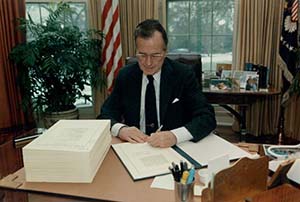
The Oil Pollution Act of 1990 (OPA 90) requires Alyeska Pipeline Service Co. to establish and fund a citizens’ advisory group.
The Council’s contract with Alyeska pre-dates OPA 90, but the similarities in the powers and duties given the council in the two documents are not coincidental. Many people involved in the establishment of the Council also actively promoted citizen involvement provisions in the federal law.
A model organization
The Act established two demonstration projects in Alaska–one in Prince William Sound, the other in Cook Inlet–designed to promote partnership and cooperation among local citizens, industry and government, and to provide citizen oversight of environmental compliance by oil terminals and tankers. PWSRCAC is certified as the program for Prince William Sound.
The Act allows an alternative, pre-existing organization to fulfill the requirement for a citizen group and our Council has done so for Prince William Sound since 1991. Each year, the U.S. Coast Guard assesses whether the Council fosters the general goals and purposes of the Oil Pollution Act and is broadly representative of the communities and interests as envisioned in the Act.
More information: Recertification Documents
As the Council for Prince William Sound pursuant to the Act, we have duties similar to those laid out in our contract with Alyeska. But the responsibilities under the Oil Pollution Act are somewhat broader, as they encompass all aspects of the North Slope crude oil transportation system through Prince William Sound and the Gulf of Alaska.
More information:
- History of the council
- Citizen oversight section of OPA 90: Terminal and Tanker Oversight and Monitoring (Legal Information Institute Web site)
- All Prince William Sound provisions in OPA 90: Prince William Sound Provisions (Legal Information Institute Web site)
- Oil Pollution Act Of 1990 – Amended Feb 2016